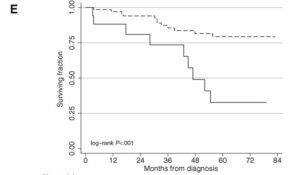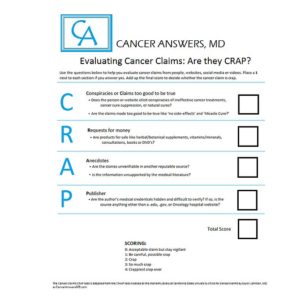Surveys estimate that approximately 30% of adult Americans and 12% of children use some form of complementary or alternative medicine (CAM). CAM is a group of diverse medical and health care systems, practices, and products that are not generally considered part of conventional medicine. CAM includes many broad categories that can include someone who provides the service (a practitioner) or not. Things such as massage, chiropractic care, herbal therapies, acupuncture, diet- based therapies, and traditional healers all fall under the broad category of CAM. For more information on what is included in CAM, please go here.
Sometimes it feels like an ‘us versus them’ war when patients come to me with questions about CAM. It doesn’t have to be this way. My alma mater, Georgetown University, incorporated CAM training into the medical school curriculum and even has a Master’s program for students who are interested in learning in-depth CAM that is based on evidence. There are many CAM approaches that I think are beneficial and many of them can be incorporated into a cancer therapy plan. For example, I recently had a family ask about a list of supplements and an alkaline diet. We went through the list of supplements and checked the doses and any interactions that may cause a problem with the chemotherapy or supportive medicines that the patient needs for her care. Of the seven supplements, I had to say no to two of them. The other five were fine in terms of interactions and didn’t appear to pose any risk that I could foresee. One of them I actually recommend to most of my patients anyway! As for the alkaline diet? There is no evidence to support that it works or has any cancer fighting ability. I gave them this information, but it’s not going to hurt the patient (your body when working properly will always make you neutral anyway) so whatever they decide is fine by me. I’ve had patients use cupping and other traditional healing methods through their therapy, and again, as long as it doesn’t hurt the patient or adversely affect how my therapy works then it’s fine by me.
I would rather my patients come to me about what they are taking and doing so that we can have honest conversations about any perceived benefits or potential risks. It is very important to always tell your doctor what supplements you take because sometimes very innocent looking things can cause problems – things as simple as grapefruit juice! With teamwork (the patient, the caregiver, and the doctor) a compromise can generally be reached which is safe.
The real problem happens when people choose to forego evidence based cancer treatment completely and try to treat their cancer by other methods that are unproven and based solely on anecdotes or blatant lies. This study was recently published in JNCI that clearly shows what happens to adult patients when they opt out of conventional cancer treatment and use unproven therapies. In the study, they looked at cancer patients who had received conventional cancer therapy and compared them to those patients that received ‘alternative’ therapy. In this study, alternative therapy is unproven methods and does not take into account supplements and wellness measures as I described above. When controlling for cancer type and clinical stage, the patients who did not receive conventional therapy still had inferior outcomes. The overall survival at 7 years was reduced by 25% as you can see in this graph:

The story gets even scarier when you take out slow growing cancers (like prostate cancer) and look at more aggressive cancers such as colorectal (colon) cancer, where the overall survival drops by approximately 50% compared to conventional cancer treatment.

Yes, there are people in the alternative medicine group that survive, but they are at a severe disadvantage compared to patients who received conventional cancer therapy and given the natural history of cancer, they are most likely alive with evidence of cancer. These unproven methods are the ones that “regular” doctors are against. We are the ones that see patients come to us in dire straits and incurable for diseases that could have been cured earlier on. We are the ones who pick up the pieces when patients are harmed by these methods. We are the ones who see families financially ruined because some predator has preyed upon them in their most vulnerable time and taken all of their money for a “cure”. These situations get particularly difficult when the patient is a child.
Our lives are lived online and information is easily accessible and it is so hard to determine what is good information and what isn’t. One of the authors of the study above came up with a CRAP score to determine if cancer information was reliable or CRAP. The tool is below and a more thorough explanation can be found here on Dr. Johnson’s blog.

Adults can choose what they do to themselves, no matter how mis- or ill-informed it may be, but the same is not true when it comes to children and it is my job as part of the medical community to make sure there is good information available and children have the best chance of cure that is supported by evidence. As I’ve said many times before, we definitely have work to do to provide better cures and we are working on those. Trust me, I’m not pleased my therapies are older than I am either. Progress is happening and the internet will be the first to tell you all about it – you just have to filter out all of the crap.
